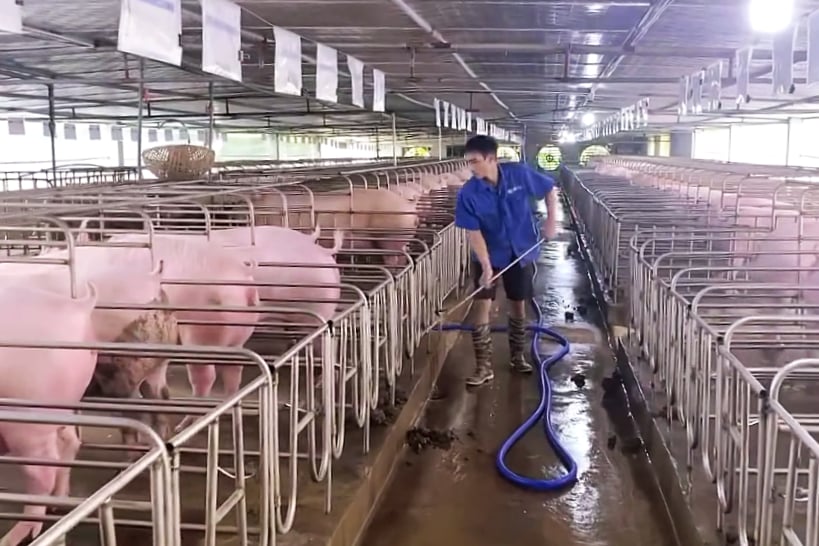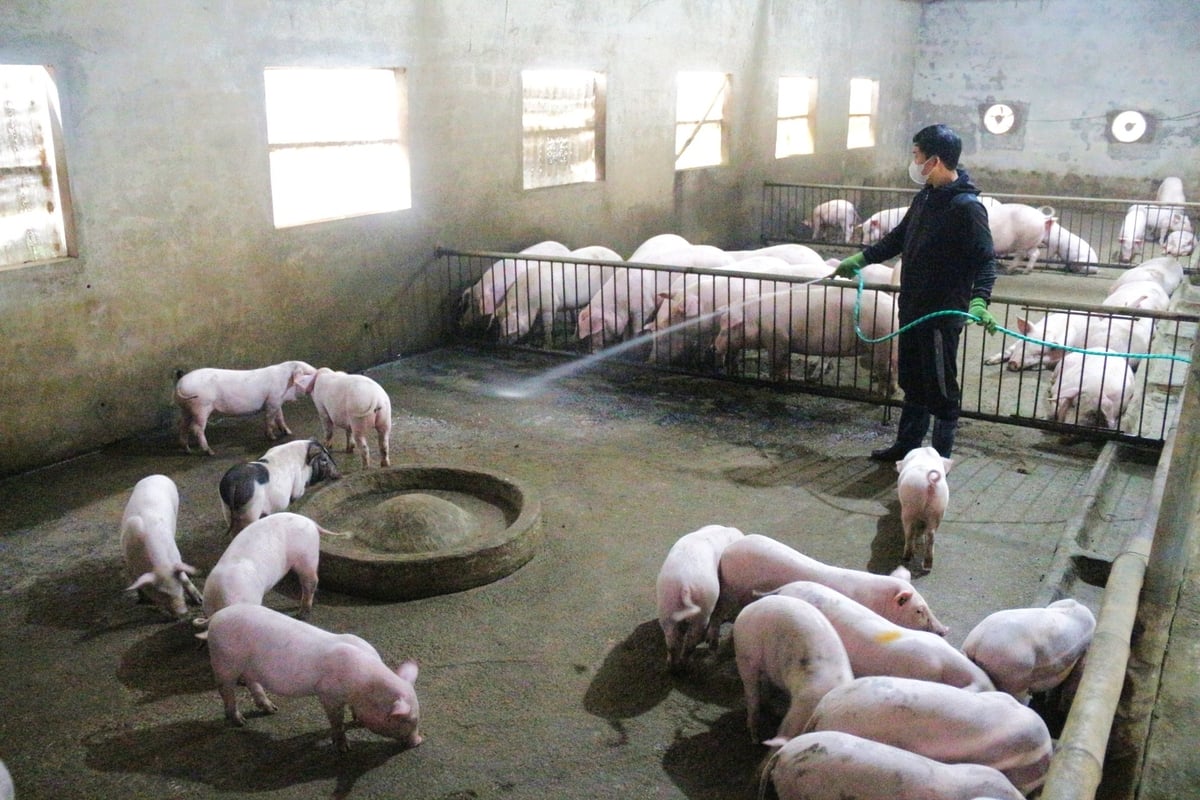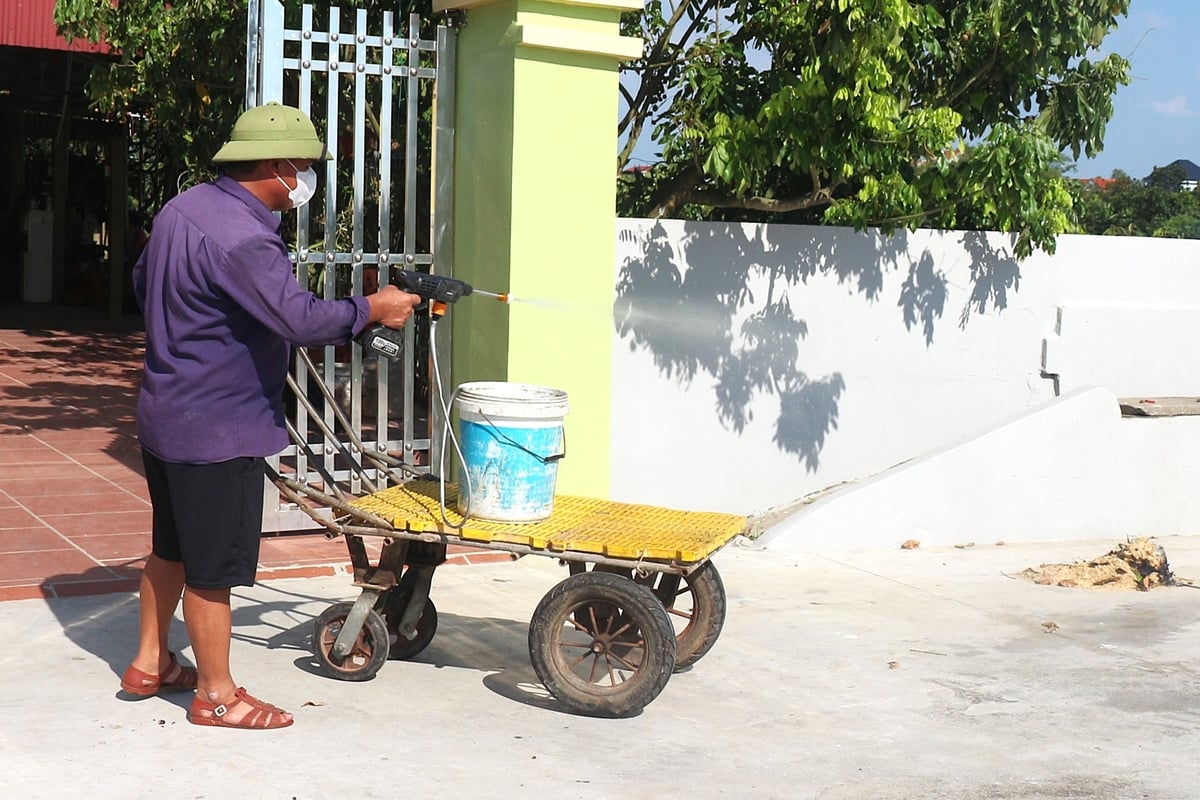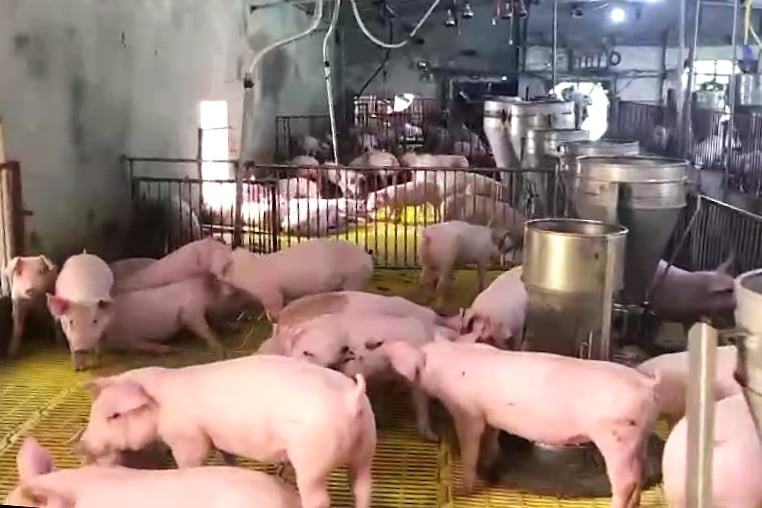November 27, 2025 | 22:08 GMT +7
November 27, 2025 | 22:08 GMT +7
Hotline: 0913.378.918
November 27, 2025 | 22:08 GMT +7
Hotline: 0913.378.918
At the start of August, the pig barn of Tran Huu Quang’s family in Bac Son village, Le Quy Don commune, Hung Yen province suddenly became the center of concern for the whole village when the pigs showed signs of not eating. They soon became lethargic and then started dying. Quang immediately reported it to the commune authorities. As for the results, the test samples of his family’s pigs were positive for the African swine fever virus.
“My herd of pigs is not large, but if they were all swept away by the disease, I would be left empty-handed. Luckily, the commune veterinary officer came down as fast as possible and gave me instructions on how to handle the situation, so I was less panicked,” Mr. Quang confided.
Quang’s family and the local government urgently implemented preventive measures. In front of the pig barn, foam boards soaked in disinfectant solution were placed, and anyone entering or leaving must step over them. White lime powder covered the cages, and Quang sprayed disinfectants daily.

With the support of local authorities, Hung Yen livestock farmers are now more proactive in preventing animal diseases. Photo: Pham Hieu.
During the peak days of the epidemic, not only Le Quy Don but also Hung Ha commune’s livestock and veterinary sector are in a state of "readiness for war." The commune government sends veterinary staff to households, distributes documents, and provides guidance on disease prevention techniques, from barn disinfection to biosecurity procedures.
As of early August 2025, African swine fever has appeared sporadically in 44 households in 33 villages of 19 communes in Hung Yen province. The province has recorded a total of 718 pigs infected and forced to be destroyed, equivalent to over 29.6 tons of meat lost.
As soon as there is information about the risk of an African swine fever outbreak, the government and specialized agencies in Hung Yen quickly take action. Authorities at all levels, specialized agencies, and each livestock farming household firmly believe that biosecurity in farming is the most effective "shield" to protect pigs and people's livelihoods.

Disease prevention is not only the responsibility of the government or veterinary agencies but also the shared responsibility of each livestock farming household. Photo: Pham Hieu.
The barns are now being cleaned and disinfected more thoroughly. Farmers restricting barn entry is now a common sight. Vehicles are sprayed with disinfectant immediately upon arrival, and the sources of breeding stock and feed are also strictly controlled.
No longer staying passive or confused like when they faced African swine fever in 2019, Hung Yen people are now more steadfast and proactive. The timely intervention of local authorities and the efforts of farmers have created solid, multi-layered biological "fences”, helping pigs stay safe from unpredictable disease developments.

Livestock farmers periodically spray disinfectant around their houses and barns. Photo: Pham Hieu.
“African swine fever remains a major threat to the livestock industry, particularly in small-scale households. Places that have not strictly implemented biosecurity procedures are at high risk of disease intrusion and spread,” says Le Van Thang, Head of Hung Yen Sub-Department of Livestock Production and Animal Health.
As soon as an epidemic outbreak is spotted, the Sub-Department tightens control over slaughter conditions, veterinary hygiene and food safety. Its ultimate aim is to detect early and thoroughly handle the outbreak when it first appears. Only then can the spread be prevented.
According to Le Van Thang, Hung Yen province has its focus on buidling production chains, facilities, and disease-free livestock areas as this is the long-term direction to protect the sustainable livestock industry.
As for specific measures, Hung Yen Sub-Department of Livestock Production and Animal Health has issued advisories to the provincial Department of Agriculture and Environment to distribute disinfectants to localities. The Sub-Department is currently reserving 37,000 liters of chemicals as a proactive response measure. If there are signs of disease development in any localities, the veterinary force will immediately guide people on how to disinfect and sterilize at households and villages.

Farm biosecurity is the most effective “shield” to protect livestock. Photo: Pham Hieu.
Regarding future plans, Thang says, “In addition to disease prevention, communes and wards need to further promote biosecurity in livestock farming. The important and urgent task is to strengthen the grassroots veterinary force so that they can truly be an ‘extension arm’ in monitoring, detecting, and handling disease outbreaks.”
Livestock farming in Hung Yen is clearly shifting towards a more concentrated and modern direction. The whole province has nearly 3,400 farms, of which pig farming occupies the largest proportion at over 60%. Notably, farms are playing a key role in the livestock structure as the pig herd at the farm accounts for over half of the province's total herd.
Translated by Samuel Pham

(VAN) According to Mr. Vo Minh Thanh, Director of the Tay Ninh Department of Agriculture and Environment, Resolution 57 has created a new development pathway for the locality, shifting from traditional toward modern agriculture.
/2025/11/26/4909-2-154329_878.jpg)
(VAN) Pearl grouper farming in HDPE cages not only delivers economic efficiency but also contributes to protecting the environment, creating jobs, and promoting marine-based experiential tourism.

(VAN) The model of making a living under the forest canopy through the agroforestry system in Van Son commune, Bac Ninh province, is expected to generate an annual income of approximately VND 30 million/ha.

(VAN) Many enterprises in Can Tho are harnessing natural energy and reducing greenhouse gas emissions in their production processes, thereby contributing to the promotion of a sustainable green transition.
/2025/11/24/3536-2-112800_176.jpg)
(VAN) Dong Nai now has tens of thousands of hectares of forests certified for sustainable management, and this area will continue to be expanded in the coming period.

(VAN) Vinh Ha hamlet (Dai Xuyen commune, Hanoi) is shifting away from small-scale farming as households adopt bioscurity into their breeder chicken models.

(VAN) Heavy rains make aquatic species more vulnerable to disease. Proactive water management and high-tech systems help farmers prevent outbreaks and protect yields.